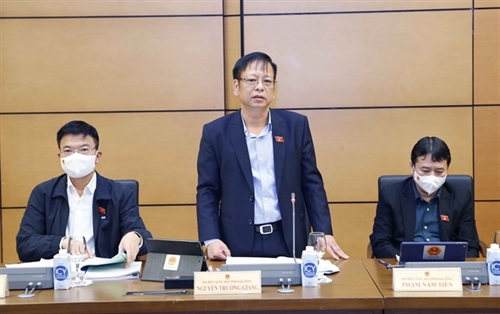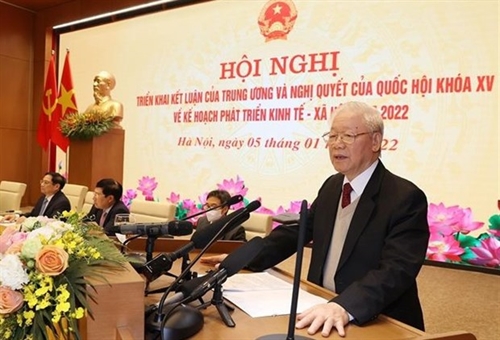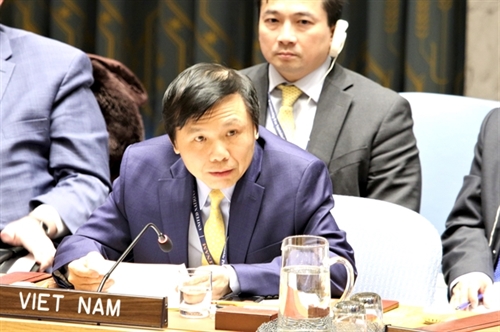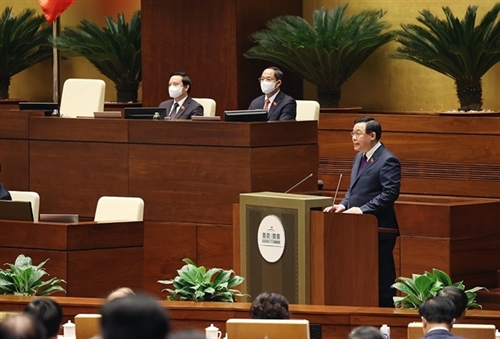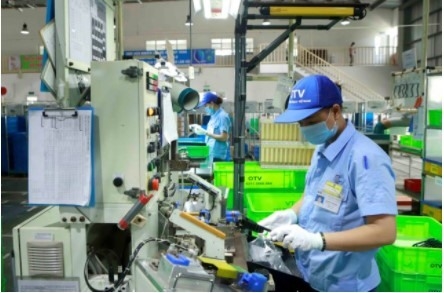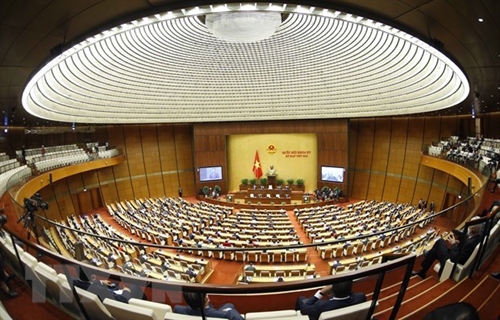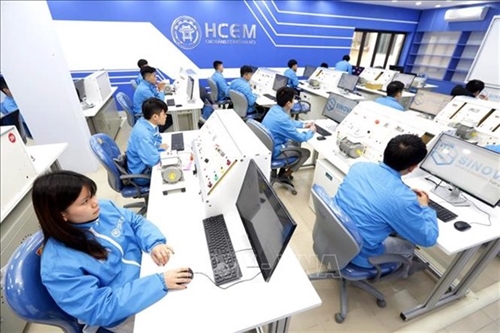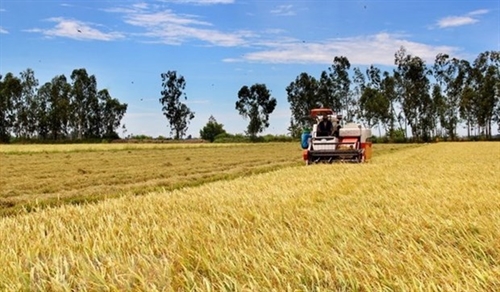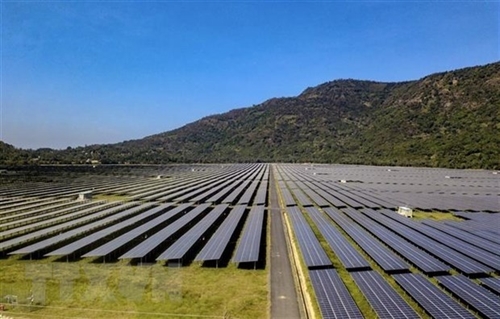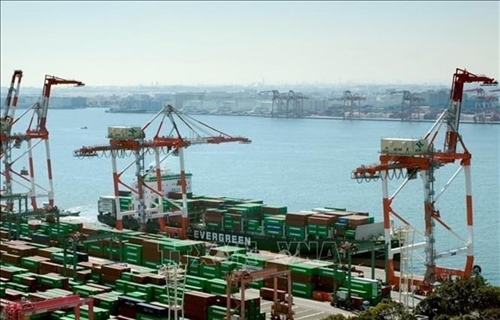Prime Minister Pham Minh Chinh on January 6 urged the financial sector to harmoniously combine fiscal and monetary policies, and better the State budget management work in 2022.
The State budget must be spent economically and effectively, he told a national conference held online by the Ministry of Finance (MoF), stressing the need to cut unnecessary expenses and ensure resources for important tasks, especially the COVID-19 prevention and control.
The Government leader also asked the sector to push ahead with the disbursement of public investments to boost economic recovery and growth.
He reviewed significant achievements Vietnam recorded last year with State budget collection topping VND 1.56 quadrillion, surpassing the estimate by 16.4 percent, and budget overspending below 4 percent, even lower than the figure estimated by the National Assembly.
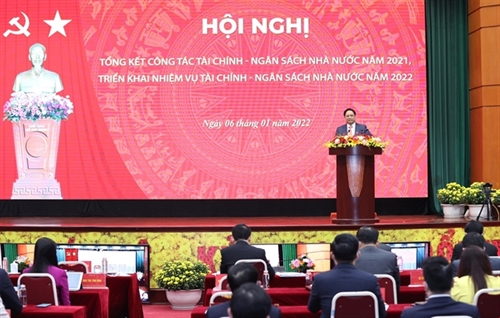 |
| Prime Minister Pham Minh Chinh speaks to participants at a conference discussing Vietnam's fiscal and financial policies for 2022__Photo baochinhphu.vn |
The treasury reported the budget collection during 2021 was a 3.7 percent higher than the previous year's with a large bulk coming from sales of crude oil, export activities and land-use fees. Collection by both central and local governments was said to be higher than the projected figures at 106.7 percent and 128.2 percent, respectively.
The State budget covered a number of large expenses during 2021 to acquire COVID-19 vaccines, support frontline workers and build up the country's medical infrastructure. By the ministry's estimate, the Government waived nearly VND 136.8 quadrillion in land-use fees and other taxes for businesses and business households on top of VND 38 quadrillion on social welfare and assistance for people who suffered income loss during the pandemic.
Meanwhile, a significant amount of funds was saved by cutting back on non-essential conferences and events, as well as overseas trips for government officials. The treasury recalled funds for non-immediate uses by central and local government to shore up COVID-19 prevention and control, as well as vaccine purchase funds.
A total of VND 74 quadrillion was allocated to pandemic control projects and to support the population on top of more than 140,000 tons of rice distributed to 33 localities that were hit the hardest by the pandemic.
Disbursement for development investment showed signs of slowing down during 2021. By the end of the year, the disbursement rate was reported to be just 74.7 percent of the annual target.
Finance minister Ho Duc Phoc said his ministry is to continue support for affected households and businesses during 2022 while introducing stimulus packages to speed up economic recovery. In addition, the ministry is to reach out to unofficial economic activities and digital commerce to prevent losses to the State budget as well as to collect unpaid duties from previous years.
As the COVID-19 pandemic is predicted to linger and affect the State budget revenue as well as spending on the pandemic combat, it is necessary to flexibly combine fiscal and monetary policies to keep macro-economic stability, said Minister Phoc.
Talking to the Vietnam News Agency, Phoc said the MoF suggested the Government propose the National Assembly allocate VND 10 trillion (over USD 439 million) in the health sector’s frequent expenditure from the 2022 central budget for COVID-19 prevention and control.
The MoF will base on the pandemic situation to use those resources from the central budget and combine them with legal financial sources of localities to meet demand in reality, the minister said.
He noted that to achieve the twin targets of combating the pandemic and developing the economy, closely combining fiscal and monetary policies is all the more important so as to guarantee resources for the COVID-19 fight and social security, and cut down input costs for production and business activities.
Regarding fiscal policies, relevant agencies have exempted, reduced, or extended repayment deadlines of tax, fee, land rent, and others in order to help enterprises, households, and individuals doing business minimize expenses and sustain activities.
Many monetary and credit solutions have also been carried out such as reducing lending interest rates and providing concessional loans to help businesses pay salary to workers, channeling credit into priority fields, and strictly controlling credit for high-risk sectors.
In addition, some fiscal policies have been implemented to give cash assistance to workers and provide indirect aid for employers, Phoc went on.
Apart from the restructuring of the State budget and public debt, appropriate monetary and foreign exchange rate policies have helped develop the Government bond market, thus mobilizing considerable resources for the State budget, according to the official.
Public debt
The ministry reported public debt for the year to reach 43.7 percent GDP with Government debt accounting for 39.5 percent, well under the 65 percent debt ceiling allowed by the National Assembly.
The country signed 12 new loans worth a total of USD 958 million and has been in technical talks for another 11 for an additional USD 924 million. The ministry has also been in talks to renegotiate 22 other loan agreements.
In 2021, the ministry disbursed over VND 13.79 quadrillion. Of which, VND 8.23 quadrillion went to localities and VND 5.55 quadrillion to central Government agencies.
Deputy Minister of Finance Tran Xuan Ha said the ministry's top priority for 2022 is the effective management of foreign loans including ODA funds. Ha said special attention will be given to loans with strings attached such as provisions on tender and tax exceptions.- (VNS/VLLF)
